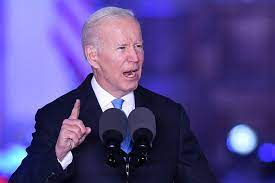U.S. President Joe Biden on Wednesday visited Israel amid the ongoing fighting between Israel and Hamas, as doubts mount over his sincerity to push for a de-escalation of the conflict.

The visit came hours after an explosion rocked a hospital in the Gaza Strip, causing Israel and Hamas to trade blame over the incident that reportedly killed at least 500 Palestinians and wounded hundreds of others.
Hamas said an Israeli airstrike caused the explosion, while the Israeli military said it was an errant rocket fired by the Palestinian Islamic Jihad that was intended to land on Israeli territory.
During his visit, Biden claimed Israel was not responsible for the blast, citing information provided to him by the Pentagon.
Amid rising concern that Gaza is facing a major humanitarian crisis, Biden also pledged humanitarian aid for Palestinian civilians in Gaza and the West Bank while urging Israel to uphold international law.
The aid Biden pledged for the Palestinians is minimal compared with his generous support for the Israelis. The U.S. president, a strong supporter of Israel, said on Wednesday that Washington would provide Israel with everything it needed to defend itself amid its conflict with Hamas.
“This visit is a significant display of support for the Israelis. By asserting that a misfiring rocket caused the hospital carnage, Biden has effectively given Israel the green light to act as it sees fit,” said Alan Fisher, a journalist with Al Jazeera, the Qatar-based international news network.
Since he was elected in 2020, Biden failed to push for genuine peace efforts between Israelis and Palestinians. Instead, Biden has enthusiastically pursued the strategy for Mideast peacemaking that Donald Trump had championed: advocating for so-called normalization agreements between Israel with more Arab countries in the absence of a peace agreement with the Palestinians, a move that has marginalized the Palestinian issue and become a destabilizing factor in the Mideast peace process, analysts said.
The lack of sincerity to resolve the ongoing conflict between Israel and Hamas, as evidenced by Biden’s differentiated support for the Israelis and Palestinians, has led to mounting doubt over the effectiveness of his involvement in the de-escalation of the deadly conflict.
The U.S. president had planned to travel to Jordan after his Israel trip for a summit, which was to bring together Biden, King Abdullah II of Jordan, Palestinian President Mahmoud Abbas, and Egyptian President Abdel-Fattah al-Sisi, but the Jordanian King canceled the summit after the hospital blast.
Canceling the four-way summit is a clear signal that the U.S. effort is “insufficient and not serious with regard to ending this war,” said Ibrahim Rabaia, a Palestinian political expert.
“The favorable position toward Israel made Biden unwelcome in the Arab countries. The Jordanian government was unable to receive him nor the Egyptian government as a result of the popular uprising in these countries and their stance toward Israel,” said Ghassan al-Khatib, a political science professor at Birzeit University in the West Bank city of Ramallah.
“The United States is part of the aggression against the Palestinian people and part of the occupation,” al-Khatib added.
As Biden is in the midst of a re-election campaign, he may use the current conflict as an opportunity to bolster support from American voters, Rabaia said.
“American public opinion is sympathetic to Israel as a result of the efforts of the Israeli media and the Jewish lobby, and Biden believes that his sympathy for Israel and his visit will boost his popularity,” al-Khatib said.
Biden is playing the card of the ongoing conflict between Israel and Hamas to garner ballots, Rabaia said, noting that by publicly supporting Israel, Washington intends to confirm its interests in the Middle East, especially after it has partially withdrawn from the region during the past years.